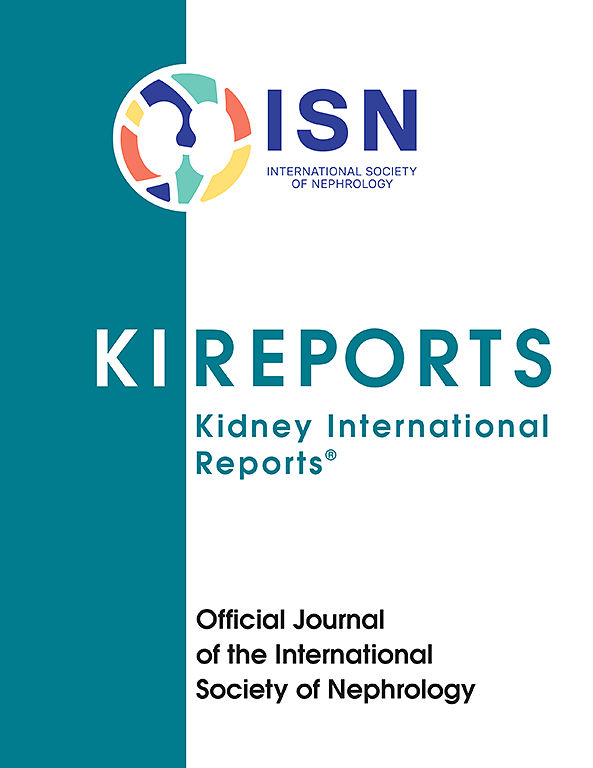特发性肾病综合征患者血清Syndecan-1与肾脏和心血管预后相关
IF 5.7
2区 医学
Q1 UROLOGY & NEPHROLOGY
引用次数: 0
摘要
特发性肾病综合征(INS)与重要的肾脏和心血管疾病相关。我们验证了血清syndecan-1(内皮糖萼损伤的标志物)可以帮助识别有肾脏和心血管不良结局风险的患者的假设。方法我们纳入来自肾病综合征研究网络(NEPTUNE)队列的348名患有INS的儿童和成人(n = 35例未活检,n = 141例轻度病变[MCD]和n = 172例局灶节段性肾小球硬化[FSGS])和34名健康参与者(n = 22名成人,n = 12名儿童)。我们使用酶联免疫吸附法测量基线血清syndecan-1水平,并评估其与肾脏和心血管预后的关系。我们进行了体外研究,以测试INS血清和不同的治疗方法是否会改变人肾小球内皮细胞(GEnC)中syndecan-1的表达。结果INS患者血清syndecan-1水平高于对照组,约1 / 3无蛋白尿或亚肾病性蛋白尿患者血清syndecan-1水平较高。接受类固醇治疗的患者,无论疾病活动性如何,其syndecan-1水平均高于未接受免疫抑制治疗的患者。蛋白尿MCD患者的Syndecan-1高于FSGS患者。在采集血清时,syndecan-1与蛋白尿适度相关,但与肾功能无关。在纵向分析中,血清syndecan-1与肾功能下降40%或肾功能衰竭和血脂异常相关。与对照组相比,复发的INS血清增加了培养GEnC中syndecan-1的表达,当分别在培养基中添加地塞米松或金属蛋白酶抑制剂时,这种情况部分或完全缓解。结论基线血清syndecan-1与INS患者的不良肾脏结局和心血管危险因素相关。本文章由计算机程序翻译,如有差异,请以英文原文为准。

Serum Syndecan-1 is Associated With Kidney and Cardiovascular Outcomes in Idiopathic Nephrotic Syndrome
Introduction
Idiopathic nephrotic syndrome (INS) is associated with important kidney and cardiovascular morbidities. We tested the hypothesis that serum syndecan-1, a marker of endothelial glycocalyx injury, can help identify patients at risk for unfavorable kidney and cardiovascular outcomes.
Methods
We included 348 children and adults with INS (n = 35 unbiopsied, n = 141 minimal change disease [MCD] and n = 172 focal segmental glomerulosclerosis [FSGS]) from the Nephrotic Syndrome Study Network (NEPTUNE) cohort and 34 healthy participants (n = 22 adults, n = 12 children). We measured baseline serum syndecan-1 levels using an enzyme-linked immunosorbent assay and evaluated their relationship with kidney and cardiovascular outcomes. We performed in vitro studies to test whether INS sera and different therapeutics may alter syndecan-1 expression in human glomerular endothelial cells (GEnC).
Results
Serum syndecan-1 was higher in patients with INS than in controls and was high in approximately one-third of patients without proteinuria or with subnephrotic proteinuria. Patients receiving steroids, regardless of disease activity, showed higher syndecan-1 than those off immunosuppression. Syndecan-1 was higher in proteinuric patients with MCD than in FSGS. At the time of serum collection, syndecan-1 modestly correlated with proteinuria but not with kidney function. In longitudinal analyses, serum syndecan-1 was associated with the composite of 40% decline in kidney function or kidney failure and with dyslipidemia. Compared with controls, INS sera in relapse increased syndecan-1 expression in cultured GEnC, and this was partially or fully mitigated when dexamethasone or a metalloprotease inhibitor were added, respectively, to culture media.
Conclusion
Baseline serum syndecan-1 is associated with unfavorable kidney outcomes and cardiovascular risk factors in INS.
求助全文
通过发布文献求助,成功后即可免费获取论文全文。
去求助
来源期刊

Kidney International Reports
Medicine-Nephrology
CiteScore
7.70
自引率
3.30%
发文量
1578
审稿时长
8 weeks
期刊介绍:
Kidney International Reports, an official journal of the International Society of Nephrology, is a peer-reviewed, open access journal devoted to the publication of leading research and developments related to kidney disease. With the primary aim of contributing to improved care of patients with kidney disease, the journal will publish original clinical and select translational articles and educational content related to the pathogenesis, evaluation and management of acute and chronic kidney disease, end stage renal disease (including transplantation), acid-base, fluid and electrolyte disturbances and hypertension. Of particular interest are submissions related to clinical trials, epidemiology, systematic reviews (including meta-analyses) and outcomes research. The journal will also provide a platform for wider dissemination of national and regional guidelines as well as consensus meeting reports.
 求助内容:
求助内容: 应助结果提醒方式:
应助结果提醒方式:


